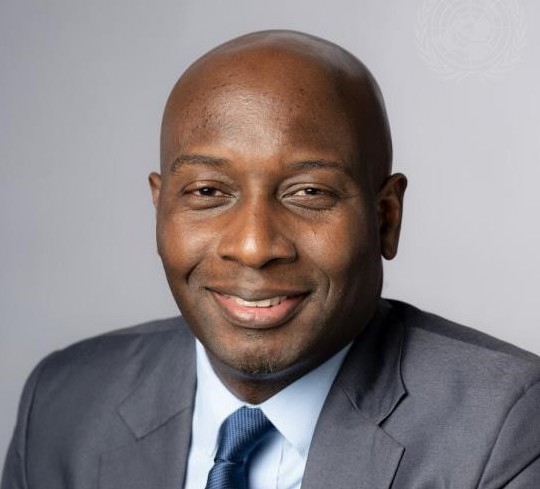STATEMENT BY HIS EXCELLENCY CHÉ PHILLIP PERMANENT REPRESENTATIVE OF GRENADA ON BEHALF OF THE CARIBBEAN COMMUNITY (CARICOM) ON THE AGENDA ITEM 86: THE PROTECTION OF PERSONS IN THE EVENT OF DISASTERS (PPED) IN THE GENERAL DEBATE OF THE UNITED NATIONS LEGAL COMMITTEE (SIXTH COMMITTEE)
FRIDAY, 4th OCTOBER 2024 UNITED NATIONS, NEW YORK
Mr. Chair, I have the honour to speak on behalf of the 14 Member States of the Caribbean Community (CARICOM).
As this is the first time, I take the floor during the 79th Session of the Sixth Committee, allow me to express congratulations to you, and your newly elected Bureau. Please be assured of CARICOM’s continued support as you carry out your duties for this session.
CARICOM also takes note, with appreciation, of the oral report presented by His Excellency Antonio Lagdameo during the 78th Session of the Sixth Committee and congratulate him on his re-appointment as the Chair for the Working Group on PPED for the 79th Session.
Mr. Chair,
CARICOM strongly supports the elaboration of a convention on the basis of the draft articles on the Protection of Persons in the Event of Disasters, in line with the positive recommendation made by the International Law Commission. Not only would it serve as the first significant international legal instrument of its kind, but it would also effectively harmonize and strengthen existing national, bilateral and regional mechanisms aimed at disaster risk reduction and response, which, at present, only address specific types of disasters or specific forms of assistance.
Though there exist soft law instruments such as the IDRL Guidelines or the Sendai Framework, these multilateral instruments are non-binding and do not always translate into concrete action. A convention, in this respect, would serve to complement existing instruments,clarify and consolidate States’ obligations with respect to response and management of disasters and disaster risk.
Mr. Chair,
It is recalled that the development of the draft articles took 10 years of work by the International Law Commission before it was adopted in 2016. Now, almost 10 years later, the raison d’être of the draft articles, contained in its preambular section, is even more significant and relevant – “Considering the frequency and severity of natural and human-made disasters and their short-term and long-term damaging impact”.
Over the years, the international community has seen where even the most well- resourced and well- prepared countries have been challenged to provide an adequate response to a disaster and have required external assistance to bolster their own efforts. Disasters have become our common enemy, without prejudice to any country.
Mr. Chair,
The Caribbean region continues to be severely affected by higher temperatures. This year is on track to becoming the hottest year on record with July being the 14th consecutive month of record-high global temperatures.
Thus, for many of us, the issue of climate change is not just hypothetical, it is our indisputable reality. It is a threat we must confront.
Our region continues to be severely affected by warmer seas, rising sea levels increased intensity and frequency of natural disasters such as hurricanes, floods, and earthquakes. Most recently, Hurricane Beryl, which impacted the Caribbean in July of this year, was the earliest Category 5 hurricane on record. It ravaged several of our Caribbean islands, including St. Vincent and the Grenadines, Jamaica and my own country, Grenada. It left in its wake – devastated family homes, uprooted communities, livelihoods, agricultural and productive sectors of our economies, and categorically reversed years infrastructural progress. We experience almost half of each year in the uncertainty of a hurricane season.
Mr. Chair, Colleagues,
Even as we are committed to achieving the Sustainable Development Goals and now, meeting the commitments in the recently adopted Pact for the Future, our reality remains unchanged as we continuously face the looming threats of natural disasters that reverse years of sustained growth and development. Many Small Island Developing States, like the Caribbean islands, depend on its natural resources to support its local economies, through sectors such as agriculture, tourism, and maritime industries. These sectors form a
substantial percentage of our GDP. When we are struck by disasters, it often takes us years just to rebuild. In fact, a significant portion of our relief and recovery efforts are supported by external assistance. We simply cannot do it alone.
In this regard, allow me, Chair, to express my sincere gratitude to the countries, United Nations agencies and non- profit organizations that assisted our Caribbean islands after Hurricane Beryl. We are profoundly thankful.
Mr. Chair,
As we continue to face an increasing number of catastrophic disasters that surpass historic records, a legally binding instrument on the protection of persons affected by disasters becomes, for us, even more necessary. The draft articles serve as a good basis for such a convention, addressing the need for international cooperation and solidarity within a framework that respects and protects the inherent dignity and human rights of persons affected by disasters, while also attempting to strike a balance between the provision of humanitarian assistance and the respect for State sovereignty.
CARICOM reiterates its support for the elaboration of the Draft Articles into a Convention.
Mr. Chair,
In the coming days, the Sixth Committee will continue its Working Group discussions on the draft articles on the Protection of Persons in the Event of Disasters, pursuant to resolution 76/119. The Working Group discussions provide the opportunity to ventilate, consider and take note of our varying positions. It is only through meaningful dialogue that we can move towards consensus. CARICOM urges all stakeholders to engage constructively on this issue and looks forward to a favorable outcome emanating from our discussions.
I thank you.

